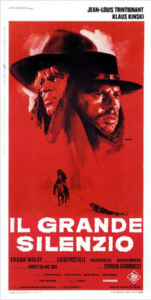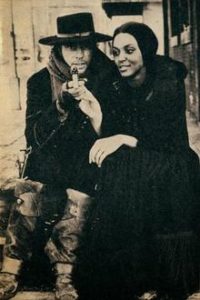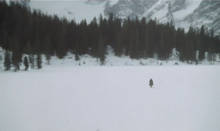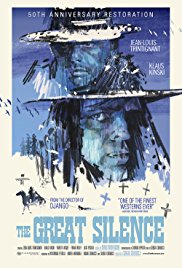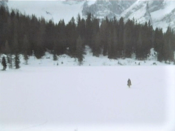Il Grande Silenzio [The Big Silence] [The Great Silence] ***** (1968, Jean-Louis Trintignant, Klaus Kinski, Vonetta McGee, Frank Wolff, Luigi Pistilli) – Classic Movie Review 7813
Jean-Louis Trintignant stars as a mute in Sergio Corbucci’s brilliant 1968 revisionist Spaghetti Western Il Grande Silenzio – a suppressed masterpiece.
Co-writer/ director Sergio Corbucci’s ambitious and brilliant Italian-made 1968 revisionist Spaghetti Western Il Grande Silenzio [The Big Silence] [The Great Silence] was conceived it as a political allegory inspired by the deaths of Che Guevara and Malcolm X, and stars Jean-Louis Trintignant, Klaus Kinski, Frank Wolff, Luigi Pistilli and Vonetta McGee (in her film début).
Set in Utah before the Great Blizzard of 1899, the story focuses on a mute gunslinger (Trintignant) defending a group of outlaws and a vengeful young widow called Pauline Middleton(McGee) battling ruthless bounty killers led by Loco [Tigrero in Italian] (Kinski) and corrupt banker Henry Pollicut (Pistilli).
It is 1896 and snow has fallen on the border between Mexico and the US, forcing many outlaws living hidden in the mountains down into the valleys. There, bounty hunters lie in wait, of whom the cruellest is Tigrero (Kinski), but the dumb mute gunfighter Silenzio or Silence (Trintignant) is out to stop the slaughter.
This exciting, though bleak and pessimistic spaghetti Western was a big hit on the European Continent, thanks to the strong action sequences, Silvano Ippoliti’s stunning landscape cinematography, the taut and stylish handling by Corbucci, and perhaps most of all to the eye-catching performances from Trintignant all moody and brooding as the gunslinger, and Kinski scarily polite as the killer. There is also a superb melancholic score to accompany it by the masterly Ennio Morricone, who regards it as his best Spaghetti Western soundtrack apart from his compositions for Sergio Leone.
Il Grande Silenzio was apparently suppressed in English-speaking countries because of its dark ending and later because Clint Eastwood planned to re-create the role in a remake, and, though he did not, some of its ideas reappeared three years later in his 1972 Western Joe Kidd.
Most Spaghetti Westerns were filmed in the Almería province of Spain to double for areas such as Texas and Mexico, but The Great Silence is mostly shot in the Italian Dolomites, as well as at the Elios Studios, Rome, Italy.
Despite the good box office in Italy, France and West Germany, it was unreleased in the United States until 2001 thanks to 20th Century Fox boss Darryl F Zanuck, who was offended by the film and swallowed the cigar he was smoking in shock on watching the ending. In 2001 it was made available on DVD by Fantoma Films and Image Entertainment. It was then given American theatrical releases in 2012 and 2017. Il Grande Silenzio was premiered in Britain in BBC2’s Moviedrome series on 26 August 1990 as The Big Silence, introduced by Alex Cox.
Over the years, it has gained a deserved cult following for its bleak and dark tone, its performances, its visual splendour with use of snowbound landscapes, Ennio Morricone’s score, and its subversion of Western genre conventions. It is now regarded one of the great Spaghetti Westerns, and Corbucci’s masterpiece.
Also in the cast are Mario Brega as Pollicut’s Assistant Martin, Carlo D’Angelo as the Governor of Utah, Marisa Merlini as the Saloon Madam Regina, Raf Baldassarre as Sanchez’s Brother, Spartaco Conversi as Outlaw Leader Walter, Remo De Angelis as Fake Sheriff in flashback, Jacques Dorfmann as Young Outlaw Miguel, Loris Loddi as Young Silence in flashback, Bruno Corazzari as Charlie, Fortunato Arena as Outlaw, Benito Pacifico as Stagecoach Driver, Mimmo Poli as Barman and Claudio Ruffini as Bounty Killer.
Il Grande Silenzio [The Big Silence] [The Great Silence] is directed by Sergio Corbucci, runs 115 minutes, is made by Adelphia Compagnia Cinematografica, Les Films Corona and Fantoma, released by 20th Century Fox, is written by Sergio Corbucci, Vittoriano Petrilli, Mario Amedola and Bruno Corbucci, is shot by Silvano Ippoliti, is produced by Robert Dorfmann and Attilio Riccio, is scored by Ennio Morricone and is designed by Riccardo Domenici.
Trintignant starred as a favour to his co-producer friend Robert Dorfmann. Corbucci said Marcello Mastroianni gave him the idea of a mute gunfighter when he told him that he had always wanted to do a Western but could not speak English, and Trintignant did not speak English either.
Corbucci was forced by producers to shoot an alternative happy ending, and also delivered another ending, a recut of the intended ending with additional footage unseen in the theatrical version. This finally appeared in the special features of Film Movement’s Blu-ray release.
The Great Silence influenced the films of Quentin Tarantino, who paid homage to it in Django Unchained and The Hateful Eight.
Other Corbucci classics are Django (1965) and A Professional Gun [Il Mercenario] [The Mercenary] (1968).
Trintignant recalled: ‘I play the part of a mute in Il Grande Silenzio. The audience won’t realize it because during the first two thirds of the film, there’s no reason for him to speak. I like it because in most Westerns they talk too much and say nothing.’
Jean-Louis Trintignant died at his home on 17 June 2022, at the age of 91.
Trintignant’s notable films include And God Created Woman (1956), The Sleeping Car Murders (1965), A Man and a Woman (1966), The Great Silence (1968), The Man Who Lies, Costa-Gavras’s Z, My Night with Maud (1969), The Conformist (1970), Three Colours: Red (1994), The City of Lost Children (1995), and Amour (2012).
Jean-Louis Trintignant won the Best Actor Award at the 1969 Cannes Film Festival for Costa-Gavras’s Z. He won the 2013 César Award for Best Actor for Michael Haneke’s Amour.
© Derek Winnert 2018 Classic Movie Review 7813
Check out more reviews on http://derekwinnert.com

